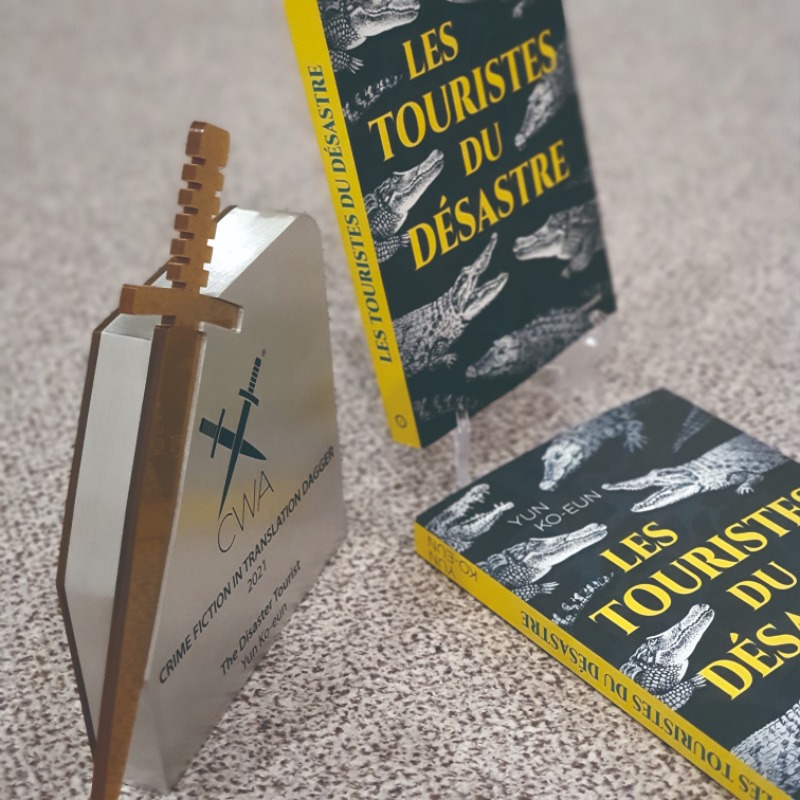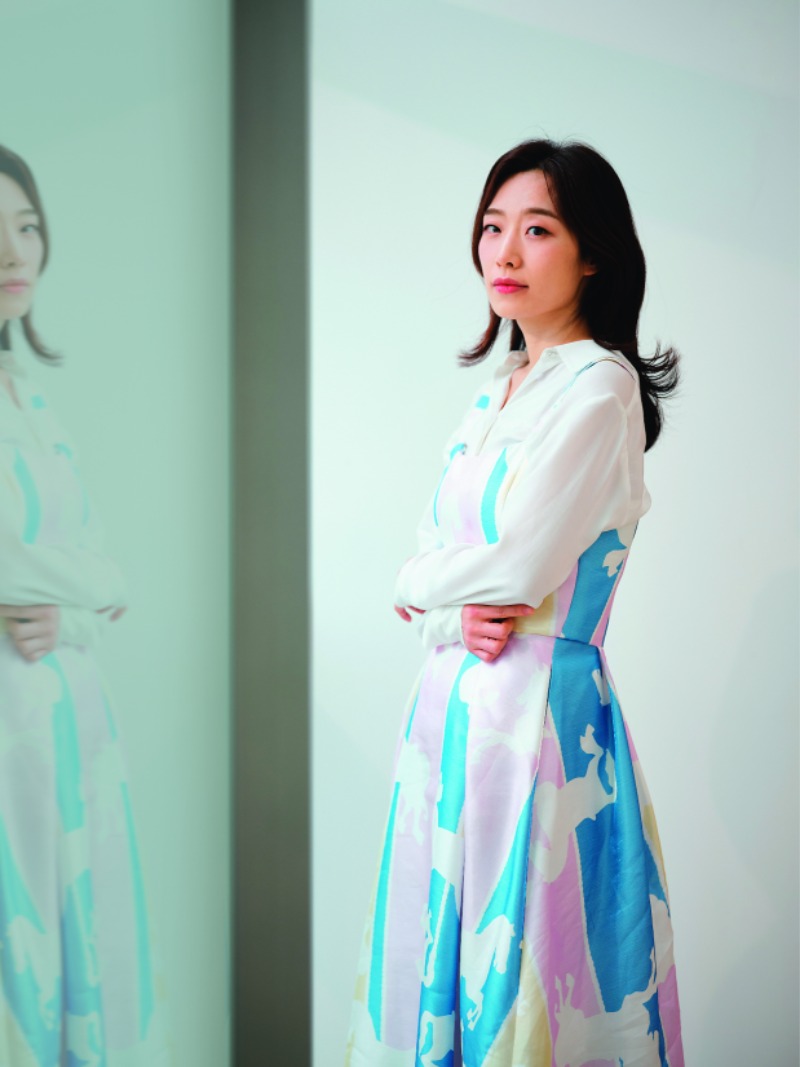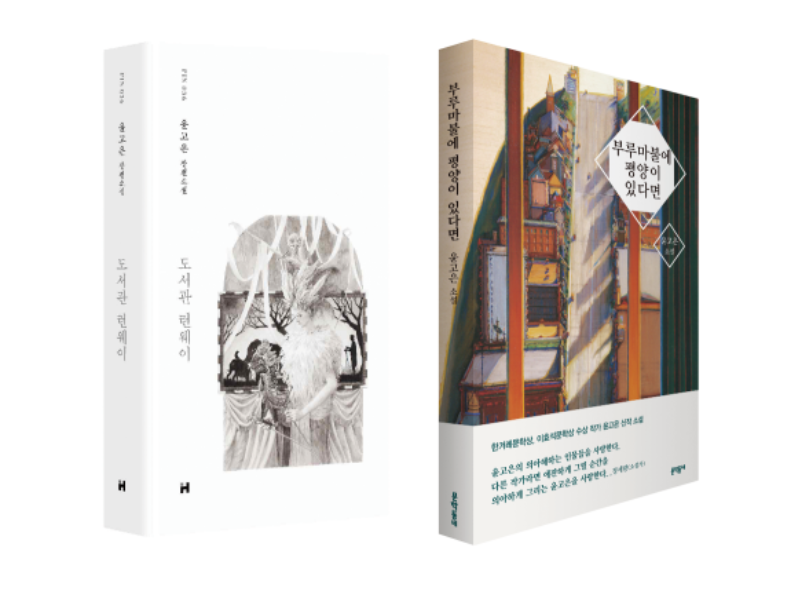Critics heap praise on author Yun Ko-eun’s insightful use of metaphor and allegory. Her award-winning novels and stories are known for their lively settings, interesting characters and sharply satirical take on the daily struggles of life in a capitalist society.

Yun Ko-eun’s second novel “The Disaster Tourist,” a satirical take on capitalist society, was awarded last year’s CWA Dagger for “Best Detective Novel in Translation” by England’s Crime Writers’ Association.
© Yun Ko-eun
Since her debut in 2003, author Yun Ko-eun has published four short story collections and four novels. The translation of her second novel, “The Disaster Tourist” (2013), was honored last year with the CWA Dagger award in the thriller category from England’s Crime Writers’ Association. Yun is the first Asian recipient of the award. The novel satirizes the cold-hearted systems that comprise capitalist society. Its characters travel to disaster-stricken areas, where they bolster their sense of safety and security. The CWA called the novel, “A wildly entertaining eco-thriller from South Korea that lays bare, with mordant humor, the perils of overdeveloped capitalism. “Yun debuted in 2003 while attending Donguk University, receiving a literary prize for college students from the Daesan Foundation. Her first novel, “Weightless Syndrome,” published in 2008, earned the Hankyoreh Literary Award.

What inspired the idea of “disaster tourism”?
Around ten years ago, when I was actually writing the book, I didn’t have the slightest idea that we would see an infectious disease (like COVID-19) sweep the globe, with everyone getting vaccinated against it. I was interested in tourism at the time, and it occurred to me that there weren’t actually many places in the world completely free of natural disaster or some degree of terrorism or conflict. The specifics might be different, but almost every destination was dealing with a disaster of one kind or another. When I was starting to write this novel, I found myself watching the Great East Japan Earthquake and the tsunami that hit in its wake. It occurred to me that “disaster” kept trying to talk to me. I found the thread of the story as I contemplated the psychology of people who go on disaster tours: first shock, then sympathy and compassion, and perhaps, after that, discomfort, followed by gratitude for my own life and maybe a sense of duty, a lesson learned, or even a sense of superiority about surviving the experience at hand.
Do you think “disaster travel” plays into capitalism?
Yes. From the very first, all my books regard everyone as an eventual cog in the machine of capitalism. Regardless of how important I may feel, I could actually disappear without a trace, with no consequence at all, making my very existence as replaceable as a toothbrush or a tumbler – this is an aspect of life that undoubtedly belongs to a deeply capitalist world.
The novel was called a “feminist eco-thriller.”
Yes, that was interesting. I don’t particularly like distinctions between “literary fiction” and “genre fiction” and so on. I think such groupings have very little actual meaning. I don’t think about genre when I write, and I don’t spend much energy on categorization after my books are published, either.
The response was strong. Why?
I think for many readers, the skeleton of this story (about the brutality of capitalism) struck a chord similar to the one struck by “Squid Game,” the Netflix original series. The profound sense of horror that no matter how hard you work at your own lot in life, you may not be able to avoid catastrophe. My guess is that many found this deeply relatable. In fact, that fear is probably much more widespread now than it was ten years ago, when I actually wrote the novel.
What’s a common thread in Korean works these days?
I think the keyword would be “survival.” We’re living in an era where our obsession over being a part of society, of not being left out or isolated, has overpowered our consideration of what actually matters and has value in our individual lives. It’s in that vein that works like “Squid Game” or “Parasite,” which won an Academy Award, are considered to be “black comedies.”

“Library Runway,” a novel published in 2021 (left), and “If Blue Marble Also Included Pyongyang,” a collection of stories published in 2019.
© Hyundae Munhak, Munhakdongne
Your novel “Library Runway” – why a library?
Whenever I go to a library and walk through the stacks, I feel really great. It’s like these countless books are my audience as I walk through the aisles. When they’re closed, the books don’t take up a lot of space, but the moment you open them, they’re filled with countless thoughts. When I think about how they’re watching me, it feels like I must be a pretty good model after all.
The book mentions the idea of “safe marriage insurance.” What is your intent?
I was exploring what might be at the core of this act, where two people who could survive on their own nevertheless choose to be together. To say that society sustains itself through the institution of marriage is too grand. Rather, the core of any marriage is two people agreeing to go on an adventure together. And the conditions should be such that both parties can freely choose the terms.
You often use ingenious and imaginative premises for your stories.
Ultimately, I think I’m interested in “unstable structures.” I want to look under this shaky ground we’re on. I enjoy the quirky elements that pique my readers’ curiosity, of course, but the parts I want to emphasize aren’t actually that bright or fun. It may seem like the ground beneath our feet right now is firm, but there’s a part of me that truly believes it could all give way at any moment. I suppose I could just say that, too, in a serious tone, but I prefer to cloak it in my own style.
A lot of writers deal with the subject of travel. Do you often travel?
I do travel whenever I can, even if it’s just a little trip. I like the actual traveling part, of course, but I really enjoy the planning, too. My favorite part is choosing places to stay. I spend so much time researching things online that when I actually get to a place and look around the hotel, it feels almost familiar, like I’ve already been there. In my short story “If Blue Marble Also Included Pyeongyang,” there’s an incident centered around reserving a place to stay. [Blue Marble is a Korean board game similar to Monopoly.]
Do your trips impact your writing?
Yes, a great deal. It doesn’t have to be international travel, either. There are things to see and experience on a short, domestic trip, or even just a jaunt into the next neighborhood. Something other than the usual crosswalks and shop signs you see every day – just seeing something new is stimulating in itself. Of course, the farther away your destination, the more unfamiliar and dangerous it tends to be, which means more opportunities for exposure and stimulation.
Does your radio show influence your writing, too?
My show on EBS (Korea Educational Broadcasting System) introduces listeners to new books, so I end up reading a wide range of books in different genres, which I enjoy. It’s not unlike travel, actually, in that encountering books I might not choose for myself can trigger unexpected results. We communicate with our listeners in real time, too, through online comments. In a way, the station studio can feel like a pit stop in outer space. When you close that thick, soundproof door and find yourself alone in there, music flowing, it’s like the radio waves are just drifting through the cosmos.
What are you working on now?
I’m in the process of serializing a novel in a magazine; it’s called “Burning Works of Art.” The main character, a painter, receives creative support from a foundation, only the chairman of this foundation is “Robert,” a genius dog with an incredible artistic sensibility who has an enormous inheritance from a millionaire. Robert critiques the various weaknesses of human beings and gives a whole spiel about what makes art real or fake. I wanted to satirize the ideas and structures of the art world by setting up this contract where the dog has all the power and the human must submit. It’ll be published early next year.
Any comments for your readers abroad?
There are people who post reviews on spaces like Instagram, or go to the trouble to identify me via hashtags, or even ask direct questions. Sometimes readers will even take pictures of my books on the shelf of their local bookstore and send them to me. I love being able to have this kind of direct communication. I hope you’ll continue reaching out.